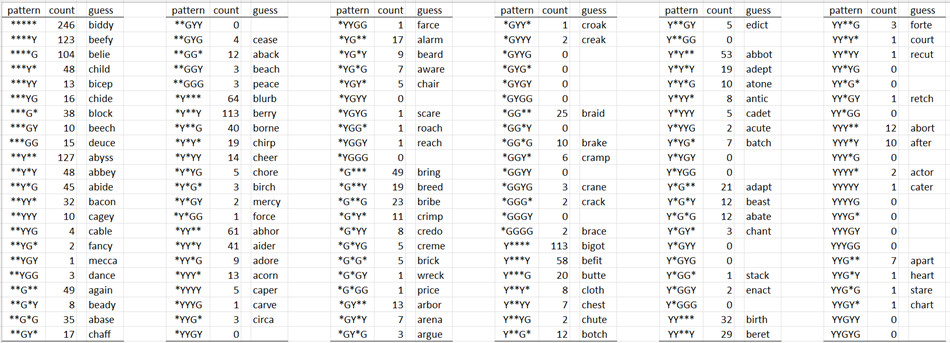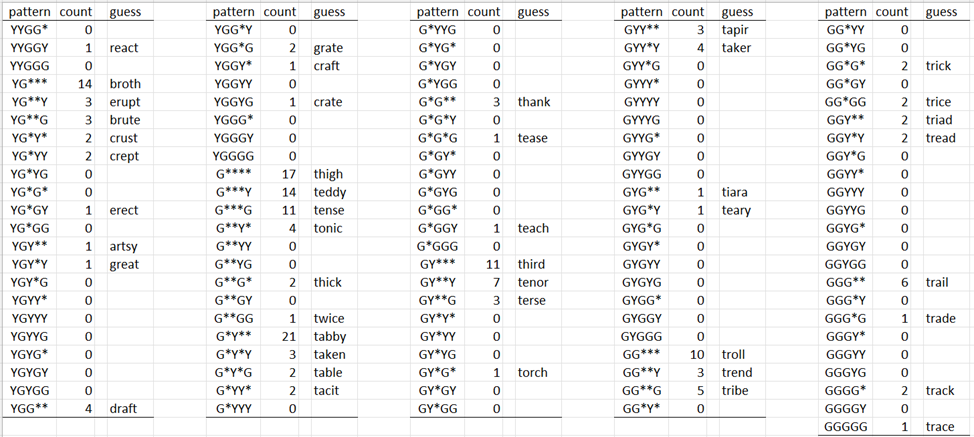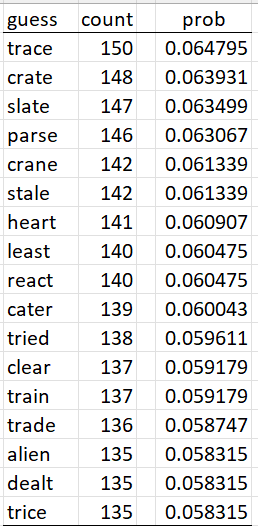Victory in one try
Since there are 2,315 possible target words in Wordle, the probability that you will guess the target in exactly one try is 1/2315 = 0.000432. In fact, it doesn’t matter which of the 2,315 words in the dictionary you choose to use as your initial guess since the probability of success is always 1/2315.
Victory in two tries
The situation is more complicated if your goal is to guess the target within two tries. Let us suppose that you choose “trace” as your first guess. Depending on the target word, Wordle will return one of the 243 patterns (as described in Figure 3 of Letter Frequency and Patterns). For example, if the target word is “dance”, “lance” or “sauce”, then Wordle will return the pattern “**YGG”. These are the only three possible target words that can match this pattern.
If “**YGG” is returned, then your optimum strategy, assuming that your goal is to guess the target within two tries, is to choose “dance”, “lance” or “sauce” as your second guess. It doesn’t matter which of these three words you choose, your probability of success is 1/3.
Note too that not all patterns are possible. E.g. Wordle will never return a pattern of “*YYGY”, no matter what the target word is when you choose “trace” as your first guess.
Figure 1 displays a list of possible patterns after a choice of “trace” as your first guess.
Figure 1 – Patterns after “trace”
Non-zero patterns
For each of the 243 patterns, Figure 1 shows how many targets will match that pattern after an initial guess of “trace”. The figure also lists one of the possible targets that match that pattern (actually the first such target in alphabetical order).
For example, if Wordle returns a pattern of “*****” (i.e. no matches), then we see from the figure that there are 246 possible target words that match that pattern. If this is indeed the pattern that Wordle returns, then you have a 1/246 chance of picking the correct target on the second try (e.g. by choosing the word shown in Figure 1 for that pattern). Also, note that the probability that Wordle returns this pattern after an initial guess of “trace” is 246/2315 (246 targets out of the 2,315 possible targets).
Probability calculation
Using the Law of Total Probability, the probability of guessing the target within two tries is equal to
This is a sum of 243 terms (one per pattern), although terms with no matching pattern are omitted. This leaves 150 terms (93 of the patterns shown in Figure 3 of Letter Frequency and Patterns have no matching targets). Cancelling out terms, the above sum is equivalent to
Thus, the probability turns out to be the number of non-zero patterns for “trace” divided by 2315, which is 6.4795%.
Best initial guess
It also turns out that using an initial guess of “trace” has the best probability of discovering the target within two tries. The next best initial guesses from the basic Wordle dictionary are shown in Figure 2.
Figure 2 – Best initial guesses
In Letter Frequency and Patterns, we suggest that picking guesses with more commonly used letters might be a good strategy (see Figures 1 and 2 of Letter Frequency and Patterns). Figure 2 suggests that picking guesses that maximize the number of non-zero patterns might also be a good strategy. Note that some words (slate, crate, and trace) appear in both lists.
Using the full dictionary
We could also use as our first guess words from the full, 12,497-word dictionary that are not in the basic dictionary. There are 23 such words that are at least as good as the words in Figure 2 (in terms of the probability of winning the game in 2 guesses). The best such words are “salet” (148), “reast” (147), “carte” (146), “caret” (145), “peart” (145), and “carle” (144). The downside of these words is that there is no chance of guessing the target word in one try.
Click here for more information about using the full dictionary.
Download Tables
Click here to download the Excel workbook with the tables in Figures 1 and 2.
Reference
New York Times (2022) Wordle
https://www.nytimes.com/games/wordle/



After my wife initially told me about this “new” trending game called Wordle and explained it to me I decided to give it a try. I was watching Good Morning America when Al Roker used the word “wizen” in a sentence, so I gave it a shot….. First time ever playing the game and I got it in one. Pure dumb luck! But it got me hooked.
In 1018 games, I have gotten Wordle in two 48 times (with no cheating). I got it in two yesterday with four letters on line one, but only one of those letters was in the correct position. Much to my surprise, I got it again today in two guesses, with one letter on line one, and it was in the wrong position. Although I often give my word choices thought, I realize some (many?) are just lucky guesses!
P.S. I have been using the same starting word since February 14, 2024: heart.
Hello Bet,
Getting Wordle in two tries 48 time out of 1018 is well within the range that I would expect. Probably not all luck given that HEART is probably not the optimum choice for the first guess (H is the weak link here). Good for you. More importantly, it looks like you are enjoying playing the game.
Charles
Interesting, but HEART is a previous Wordle, so the best you can ever do is a 2/6
I agree with the use of the 2 most common vowels AE and 3 common vowels, the most common being RST and only STARE has been a previous Wordle and, on that day, I had 5 yellows (frustratingly).
I have guessed the correct word in one go on two occasions.
I do not use any formula and just pick a random word.
Well done, Mary. Does the target word on previous plays influence the choices you make?
Charles
I have been using TARSE. Try throwing that into your calculator.
Hi Damon,
What sort of results are you getting with TARSE? When I wrote this webpage, this was not a word in the Wordle dictionary. Perhaps that has changed, although the word is obsolete.
If it is a legal word, then it seems like a good choice. For winning in two tries it is just as good as REAST. I don’t know how it compares for winning in 3 tries or the expectated number of guesses.
Charles
Try using SOARE as “s” is supposedly statistically used more than ” t” .. I have also used AROSE a variation of letters fron soare.. maybe this will up your percentage.
I have gotten Wordle on the 2nd try 56 times in the 1264 games I’ve played. 4 times on the 1st guess. I like to start with the first “acceptable” word that pops into my head though I will often steer it towards my favored multiple-vowel- consonant-letter blends. And I’ve noticed that on the times I get it in 2 that second word rushes into my head rather than being the result of careful contemplation on the results from the first guess. I half-jokingly refer to it as “psychic energy”, tapping into to the puzzle creators’ minds. But those minds are probably AI bots so….
Congratulations. Looks like you really do have some special powers.
Charles
I’ve recorded 30 solved puzzles in 2 tries in 357 tries. 8.4%.
Words just pop into my head. I use Slate as my first word.
Lars,
Congratulations. You are doing great.
Charles
The time I got a “one” or first was when I was sitting on our deck, looked out at the Pacific Ocean, saw a whale breach – so put “whale”! Bingo.
My first word is always something relevant/topicsl topical to the current situation.
Greetings from Bonny Hills Australia.
Regards to all
Alan,
Congratulations. Thanks for sharing this.
Charles
It appears that your 2nd guesses is not considering getting it wrong and prepping for a third guess.
For the 1/3 example “It doesn’t matter which of these three words you choose, your probability of success is 1/3 for DANCE/LANCE/SAUCE.” is only true for “second guess win.”
But the ideal pick is clearly DANCE / LANCE as better than SAUCE because if it isn’t sauce, you have a coinflip of DANCE/LANCE whereas if you pick DANCE/LANCE, and get it wrong you know on the next turn what the word is.
Expanding that to less favorable odds like ****G which is 1/104 2nd guesses, your suggestion of BELIE is worse than SLIDE. In game, BELIE receives a 70 skill score over SLIDE receiving 82
Following the logic of TRACE being the best choice towards a 2nd word win, your 2nd word picks should be the one in each situation that increases probability of a 3rd round win, and so on.
Yes, you are correct. The strategy given is only valid if the game ends after two turns. You either win in two turns or not.
For a strategy beyond two turns you need to read on to the other webpages on the Real Statistics site. You can always win within 5 turns.
Charles
Lots of use the same 2 words to start. This gives us the verbs and sometimes consonants, too. Just guessing and putting a word in there is not strategic nor does it make someone smart. If they didn’t cheat, that’s luck. Where’s the fun in that?
I agree. Even though I have worked to find an optimum strategy for Wordle, the fun for most of us is playing the game and seeing what happens.
Charles
My sister has gotten it on the first try five times in 1081 games. She has gotten it on the second try 53 times. Seems hard to believe she could do that well. I see that a word list exists in alphatetical order of every possible word, which would help and I realize she could see what words have already been used and avoid them on the first try. What are your thoughts?
I see that a mathematician has looked at Wordle results and has figured out lots of people “cheat”. It is just for fun to I think getting help is ok as long as you do not pretend you did not get help.
Hi Bill,
Your sister has certainly beaten the odds for getting the word in one try. Her results for two tries are quite reasonable though.
If your sister is eliminating words that have already been used then perhaps her results are reasonable; otherwise she would have to be really lucky to win in one try five times in 1081 games.
Charles
this statement doesn’t make sense to me:
“Since there are 2,315 possible target words in Wordle, the probability that you will guess the target in exactly one try is 1/2315 = 0.000432.”
does the probability of guessing Wordle in X tries not diminish over time, as possible answers are eliminated from the pool?
for instance, on the day before the 2309 answers run out and there is only 1 possible answer left, are my odds still the same? (hmmm, maybe)
Hi Peter,
If words are not repeated and you keep track of the words that have already appeared then the probability changes over time as you have suggested. Otherwise, the statement holds.
Charles
Doing the word on another site and then coming back and claiming to get it in one try, is the most likely explanation. Psychic powers is a distant second. He is the author of the puzzle would be third.
I belong to a wordle group on FB. One player has got 5 x 1’s out of the last 13 games. Out of that sample of 23 games, he got one 3, and all the others were 2’s
5 x 1/6
1 x 3/6
7 x 2/6
He’s played about over 1,000 games, this was just a typical sample. I can understand a person getting 2’s as at least they have a starter to test their hunch, but so many 1/6 – almost 50% is quite unusual.
What do you think?
Valda,
It is highly unlikely to get 1 much less multiple wins in one try.
Charles
Cheating is my best guess.